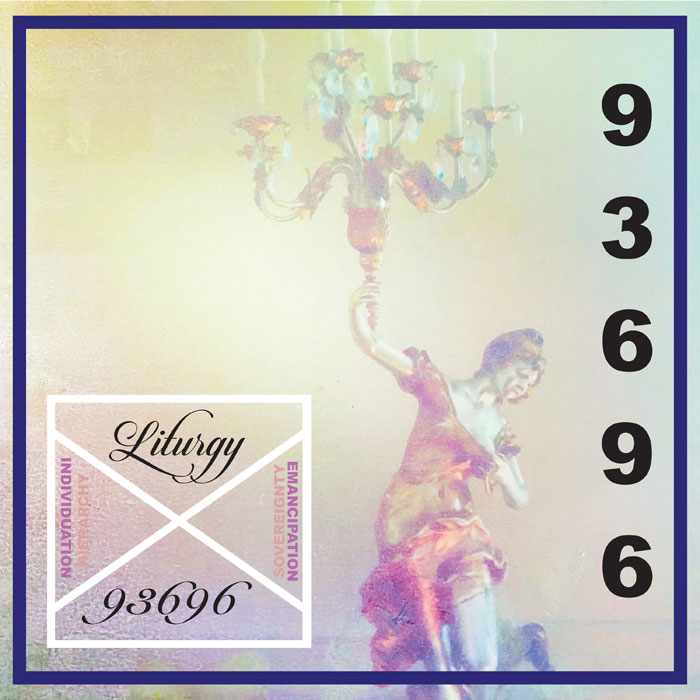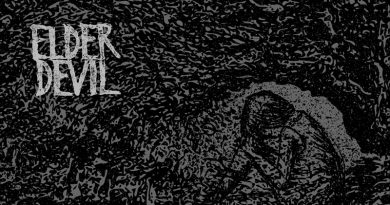Review: Liturgy ‘93696’
This album is epic in the traditional sense of the word. The first track, Daily Bread, opens with Ravenna Hunt-Hendrix‘s haunting vocals, reminiscent of a Tibetan chant with a wavering hum, like that of a singing bowl. Digital skips and bright string plucks create an intimate and soothing atmosphere, before calmly receding back into the single voice that we began with.

Then, the full screeching fury of the second track, Djennaration, kicks in following a tumbling drum intro. Initially spritely and with the energy of a marching band, the track ebbs and flows in dramatic waves, gradually bringing in pained strings and tragic, twinkling melodies. Liturgy shifts from tense accumulations of sound to symphonic crescendos that rise, settle, and then return with even greater force. Hendrix and Mario Miron’s guitars span from shrill tremolo picking lines, twisting and building together to crashing church organ-like chords. Drummer Leo Didkovsky is extraordinary throughout this record. Along with bass player Tia Vincent-Clark, they nail down the mathiest of rhythms that keep Liturgy firmly in the ‘heavy’ section.
This becomes more pronounced towards the end of Djennaration, when the drumming is rigid and decisive under the shredding intensity of the guitars. It’s almost djent in its complexity and precision. Djennaration is said to be another Liturgy exploration of 19th century classical composition. It does feel church-related, but not in the vein of Batushka. Rather, it calls to mind the bright, sprightly sound of American marching bands playing Stars and Stripes Forever.
Grayson Haver Currin, writing for Hay Fork Music, said Liturgy divides people into ‘disciples’ and ‘cynics’. I am probably more of a disciple of the band’s philosophy and music because what you hear is so different. Liturgy are unique and thought-provoking, offering ideas and perspectives that are not commonly found in other music. Delving into the theory of ‘Liturgy’ is a gargantuan task best left to the people trained to get into it (with PhDs, probably).
However, a little bit of information is interesting if you want to understand more of what you are hearing. It’s not easy, admittedly. Some of the philosophical language and imagery employed can be challenging to interpret. The cover of H.A.Q.Q. which is an excellent album, may not be immediately understandable without some background knowledge. In simple terms, 93696 is Hunt-Hendrix’s exploration of four laws that define her conceptual interpretation of heaven: Sovereignty, Hierarchy, Emancipation, and Individuation, and these inform the creation of the dramatic songs on the album. She has called her music ‘sacred secularism’ before now, and this is part of a wider interest in a utopian future.
Tension, unrest, turbulence and intense drama are all present throughout…
Thinking more broadly and in a musical context, Liturgy fits more into the template of the progressive bands of yore like King Crimson. There is a clear arc and development through the albums. It is a distinct, huge, and wholly non-derivative experimental sound. This has been building for years now. There is a line in the sand since Origin Of The Alimonies, although Hunt-Hendrix seems to have been building to this point throughout each of her releases, either expanding the musical pallet or the philosophical one.
So, against this canon of work, here is the double album 93696. The number ‘93696’ is a ‘number derived from the religions of Christianity and Thelema, a numerological representation of heaven, or a new eon for civilization’. Arguably 93696 is the new Liturgy. Musically, the album maintains its ties to experimental, opera, and electronic music, while introducing new layers of thought and reflection. The intensely complex rhythms and intense repetition are still there. However, this album is more urgent overall, less melancholic and more forceful with its ideas. Where for example, The Ark Work felt like pure experimentation, 93696 is the fruition of that work.
Hunt-Hendrix‘s classical training is evident throughout the album. Tension, unrest, turbulence and intense drama are all present throughout. Occasionally broken up with brief interludes called Angel Of… Sovereignty, Hierarchy, Emancipation and Individuation. I’m not into angels or sovereignty, but musically these are well placed on the record and offer some respite between the onslaughts. Furthermore, for all the highbrow thinking, there is still metal on this record. Caela does clearly have Hunt-Hendrix and Miron descending below the 12th fret with some really teeth-grinding grooves that are joined by choral voices. Ananon has some gritty chugging grooves amongst the tremolo picking. These are welcome moments. The structure of the album is very well-considered.
The large, intense tracks are not back-to-back. The epics on here, like the title track 93696 and Antigone II are cinematic, or operatic if you’re Liturgy, and it’s not necessarily easy listening (do you remember King Crimson?). 93969 weaves between subtle, spacey moments with chimes and violins and the most grating repetitions. However, there is more atmosphere on these larger tracks. Djenneration, for example, is a pummelling tension and release, here there are more graceful swells, rather than belting crescendos.
The final track, Immortal Life II, feels like the credits to something truly extraordinary, with piano, choral vocals and light string strumming ushering the listener along. It’s a surprisingly lovely ending to a colossal album, that is somehow just over one and a half minutes long. Transcendental indeed.
Label: Thrill Jockey Records
Band Links: Facebook | Bandcamp | Twitter | Instagram
Scribed by: James Bullock


